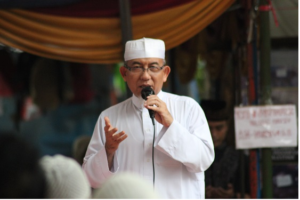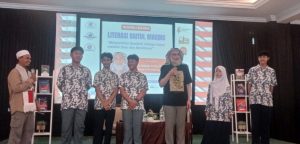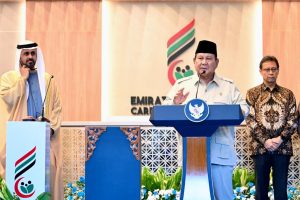
The Prophet was blessed with a higher level of empathy and compassion than other people, which is just one of his noble character traits. (Foto:Onislam)
By: Sadaf Farooqi*
We all strive to acquire some kind of knowledge at different points in our lives.
As we traverse the journey of life from cradle to grave, there is always something new out there for us to learn or know; be it a new skill, technology, book, subject, field of research, or device that needs exploring or mastering in order for us to accomplish our goals or achieve something worthwhile in life.
Knowledge is acquired by different methods: sitting at a desk, reading a book; listening to a more knowledgeable person speak on a subject; watching a skilled person perform a certain task; or, finally, by just jumping into something and learning to do it by trial and error, by hook or by crook.
Also Read: Imaam Yakhsyallah: Nurture Love for the Prophet, One Will Be with Whom One Loves
The last method of learning, which is completely practical and on-the-job, so to speak, is one of the best ways to learn something new, especially if it is a physical skill that needs mastering, or a device that one needs to know how to operate and control.
Practical hands-on methods of learning leave some of the most lasting ‘lessons for life’ on an individual.
The younger they are when they are practically trained, the more poignant and permanent will the lessons be that they take away, insha’Allah, because youth is a time in which a person absorbs knowledge and skills like a sponge.
Prophet Muhammad’s Teaching Style
Also Read: Thanksgiving: An Islamic Perspective
Prophet Muhammad (peace be upon him) is well-known for having preached less and practically embodied righteous actions more, as a role model and teacher of the Muslim Ummah.
He was a profoundly wise man of few meaningful, deep yet concise words. He rarely taught long oratory classes to his companions, wives and children, with his weekly Friday and Eid sermons also clocking in at less than an hour.
Yet, the positive and long-lasting impact that Prophet Muhammad (peace be upon him) left on the entire humankind cannot be questioned or denied, even by his most antagonistic critic. How did Prophet Muhammad achieve such a great deal in a short span of twenty-three years?
There are many factors unique to his personality that enabled this to happen, but for this article, I have chosen a very interesting (H.R. Shahih Al-Bukhari ) to elaborate upon how he practically taught ethical values and lofty morals to his companions.
Also Read: Achieving the Position of Fasting Expert with Kindness of Morality
Furthermore, please note that his style of training and teaching varied according to the persons he was with, based on their distinctive personalities, talents, strengths and weaknesses.
Father of the Kitten
Abu Hurairah (may Allah be pleased with him) has narrated the highest number of hadiths from the Prophet (peace be upon him). While this is indeed a great achievement to his credit, we must remember that in order to achieve greatness, a person usually has to endure a lot of hardship, pain and suffering.
Many scholars from among our pious predecessors, who have served Islam with their superior knowledge, went through phases of extreme poverty and hunger while seeking it.
Also Read: The Power of Charity in Ramadan
The companion known famously as the ‘father of the kitten’ was no exception. Abu Hurairah was used to endure so much hunger that, according to his own admission, he sometimes had to sleep on his abdomen, or tie a stone on his belly to alleviate it.
Self-Respect: Not Asking Anyone for Food
One of the positive qualities of Abu Hurairah becomes apparent in this hadith by how he didn’t ask anyone for food, not even his friends from among the Prophet’s companions such as Abu Bakr and Umar (may Allah be pleased with them), when they passed by him while he was sitting on their paths in his hungry state.
Instead, he asked both of them a question about one of the verses of the Quran, in the hope that this would make them look at him, and they would then be able to read and decipher the signs of hunger upon his face and body.
Also Read: Ramadan Brings the Change
This shyness and modesty in hiding one’s needs and wants from people indicates a lofty level of reliance and trust upon Allah, which the companions of Allah’s Messenger possessed. Perhaps this also indicates that Allah chooses His righteous slaves with such high moral values to do the work of His Deen by serving it with their memory and knowledge.
Another important lesson for us to learn from this action of Abu Hurairah is that anyone with self-respect and dignity avoids asking anyone besides Allah for food, or for their other basic personal necessities, even if they are in considerable hardship and anguish because of it.
We should remember this whenever we desire to invite ourselves over to someone else’s house just to have some of the awesome cake they bake, or the delicious pilaf rice that they cook.
An Empathic Prophet and an Obedient Disciple
Also Read: Ramadan, the Month of Education
The Prophet (peace be upon him) was blessed with a higher level of empathy and compassion than other people, which is just one of his noble character traits as the leader of the Muslim Ummah.
This trait becomes obvious by the fact that when he came across Abu Hurairah and saw the clear marks of hunger upon his face and persona, he immediately told him to come along with him. Abu Hurairah uses the Arabic word “arafa” to describe how the Prophet “recognized” the hunger that he was feeling that was apparent on his face.
Note that, despite following the Prophet to his home, which he entered only after seeking permission first, Abu Hurairah still didn’t ask his host for any food, even though the Prophet immediately asked the inmates of his home regarding the source of the milk, i.e. who had sent the bowl of camel milk that was present in his house.
Patience, Sacrifice and Self-Control in Serving the Less Fortunate
Also Read: Come on Do I’tikaf
Then began the rather rigorous practical training session of Abu Hurairah; a practical lesson in patience, self-control, sacrifice, and obedience of submission to the command of Allah’s Messenger.
The Prophet (peace be upon him) knew very well that Abu Hurairah was extremely hungry. However, he first asked him to call the people of As-Suffah to his home. Abu Hurairah complied, and when the poor students of Islamic knowledge had arrived and were seated in the home of Allah’s Messenger, the latter then further asked Abu Hurairah to pick up the bowl of camel milk and individually serve each one of the members of As-Suffah.
This was not done by merely passing the bowl to one of them and letting him pass on the bowl to the next one in line, and so on. This was done in the form of a personal ‘waiting’/valet service by Abu Hurairah himself, i.e. he would hand the bowl to each member of As-Suffah, wait there, standing till he drank his fill, take the bowl from him, and move on to similarly serve the next person in line.
He did this until he had watched, with his empty stomach undoubtedly still pining for food, each member of As-Suffah drink camel milk to his fill right in front of his eyes, after taking the bowl from his own hands every single time.
Also Read: During Ramadan, Merit and Good Deeds are Multiplied
Imagine what Abu Hurairah must have felt at that point? He knew that the Prophet (peace be upon him) knew very well about the extent of his own hunger. Yet, the Prophet asked him to serve every member of the companions of As-Suffah first!
In Abu Hurairah’s own words, regarding how he felt when the Prophet (peace be upon him) ordered him to call the people of As-Suffah after enquiring about the milk:
“The order of the Prophet upset me, and I said to myself, “How will this little milk be enough for the people of Al-Suffah?”, though I was more entitled to drink from that milk in order to strengthen myself, but behold! The Prophet came to order me to give that milk to them. I wondered what will remain of it for me, but anyway, I could not but obey Allah and His Apostle so I went to the people of As-Suffah and called them…”
What to Learn from This?
Also Read: Ramadan, The Month of Jihad
Was this lesson too ‘harsh’? Surely not, because we must remember that the Prophet (peace be upon him) was the kindest and most compassionate amongst people.
Definitely, what he taught Abu Hurairah through this incident was a more valuable form of charity than simply alleviating his hunger by giving him the bowl of milk to drink first.
The Prophet taught Abu Hurairah to think of those less fortunate than him. Surely, inviting the people of As-Suffah to partake from the milk before himself, in his state of dire hunger, would teach him that there were others who had dedicated themselves so wholly to serving Islam, that for them, feeling such hunger was a daily norm; who didn’t even have enough clothes to cover their backs, or families to live with, or personal dwellings to live in, much less regular meals to eat.
To patiently bear one’s own distress and give preference to those who are more in need of a blessing than we are; to quell your own logic and desire for a blessing in submission to the command of Allah’s Messenger (peace be upon him) these are a couple of the valuable lessons that one comes away with after reflecting upon this beautiful hadith.
Also Read: Increasing Social Care in the Month of Ramadan
Conclusion
The Prophet was an expert at recognizing potential and ‘milking’ it for the long-term benefit of Islam.
The training his company imparted to his younger companions such as Aisha and Abu Hurairah, enabled the latter to go on to memorize and narrate thousands of traditions attributed to and from the Prophet (hadiths), which continue to benefit millions of Muslims to this day.
No doubt it was the Prophet’s effective practical training of his talented companions that allowed all future generations of Muslims to benefit from thousands of hadithsthat eventually branched into complex categories of technical Islamic jurisprudence, which grant all lay-Muslims ease and guidance in day-to-day matters related to every aspect of life.
Lastly, while I must admit that Abu Hurairah’s love for cats simply delights me as an ailurophile, I hope that, as a foodie who loves to try different cuisines, I am also able to tolerate my hunger more the way the Prophet made him do, and instead of focusing on feeding myself first, I am able to feed those who are much hungrier than me, on a regular basis, insha’Allah. (T/Imt/R04)
*This article published at www.onislam.net
Mi’raj Islamic News Agency (MINA)








![Israeli tanks and APC’s gather by the Israeli – Lebanese border. Amid Israel’s escalating campaign against Hezbollah in Lebanon on September 30, 2024. [Erik Marmor/Getty Images]](https://en.minanews.net/wp-content/uploads/2024/10/IMG_20241001_203226-300x197.jpg)























 Mina Indonesia
Mina Indonesia Mina Arabic
Mina Arabic